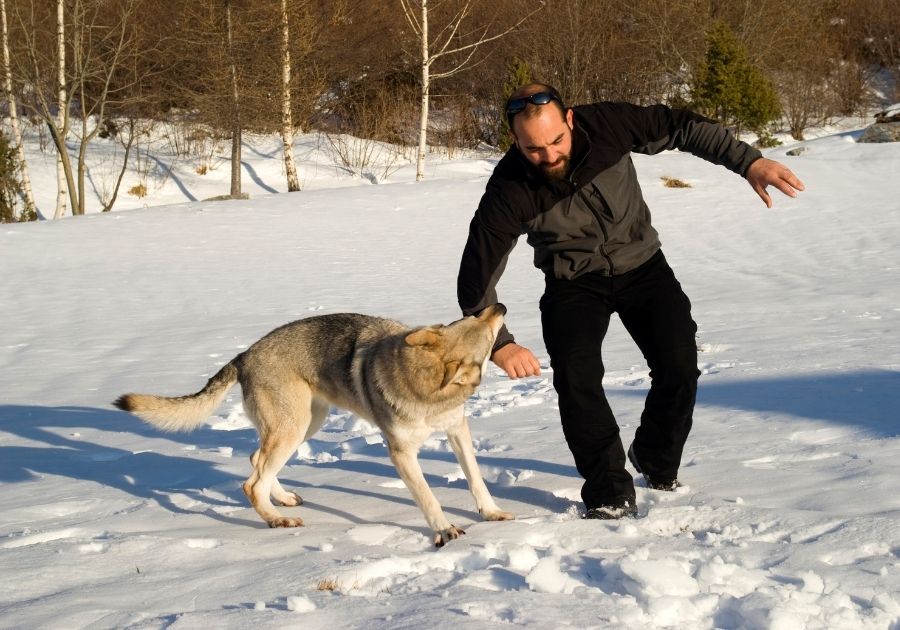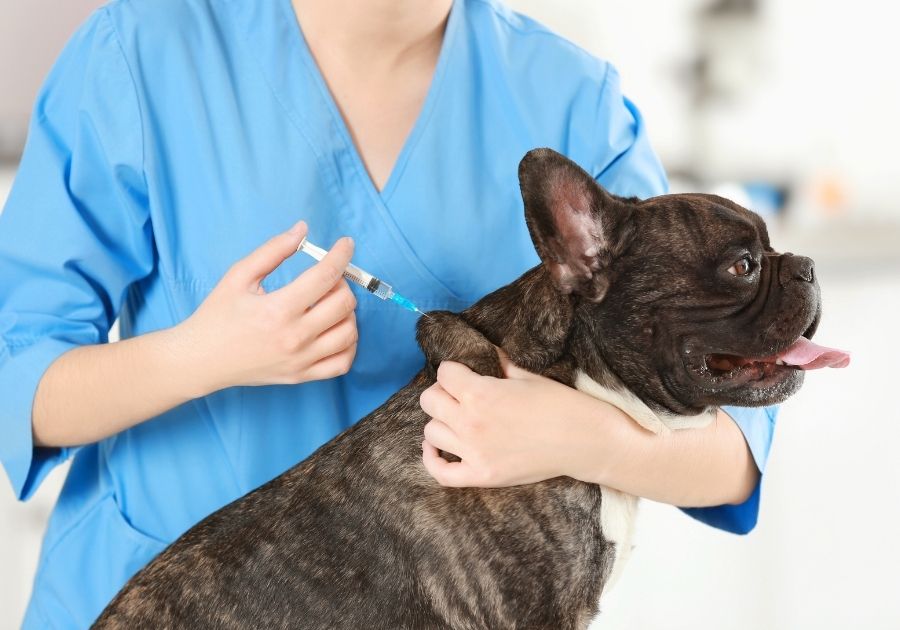For most folks these days, dogs come off as way more than pets; they are family and are in every way as valued as Uncle Sam or Aunt Robin.
Like over 20 million others, you likely have one of these adorable creatures and would go to any length to keep them safe and happy.
As such, we would understand if you are shocked and indignant to discover that several US dog laws enforce local councils to seize and ‘detain’ your K9 if the said council decides they have transgressed some law.
But that’s not the worst part.
In severe cases of law transgressions, like when your K9 finds trouble and severely injures someone, these police powers, as well as other third parties, are allowed to euthanize your dog legally; an action the law prefers tagging as ‘humane destruction. ‘
We all love our pets, and if they have to go, it has to be by natural causes, don’t you agree?
On our side here, we do, and strongly so.
To this end, we understand that to keep your dogs on the good side of the law and thus safe, you have to be familiar with the most important United States enacted statutes and related legislations.
As such, we’ve compiled them in great detail in the remainder of this article — so, stick along.
To What Extent are you Liable for your Dog’s Behavior?
Strict Liability
It’s a sunny day and a quiet walk; you left your Labrador on the sidewalk – after all, this won’t be his first time – to make some withdrawals.
Before you got to the ATM stand, you heard a commotion – apparently, your Labrador, for whatever reason, attacked a passerby.
Worse, he bit the victim and drew blood.
In this hypothetical scenario, your first thought might be with the injured person and might then switch to your Lab.
What would happen to him?
Frankly, if you ever got involved in this sort of situation, we urge you to be more concerned with what the law has in stock for you.
Because the fact is, most states have laws termed ‘strict liability laws’, and this means whether or not you knew that your dog was dangerous, you are liable to get sued by the victim for compensation for the injuries inflicted by your pet.
Whether or not your pet has ever displayed such behavior previously is of no importance to the law.

Consequently, arguing that you had no idea, your Lab preferred blood to Protein Feed would serve no purpose.
Neither is the fact that you took care to muzzle him, and for some reason, it got loosened equally helpful. If you are served, you have to pay.
However, there are some limitations to the law, and you are only liable if:
- the victim was bitten, and
- they were bitten in a public area or ‘lawfully in a private area’.
For instance, a mail delivery personnel or perhaps a process server carrying out his duty, bitten by your dog in your residence is legally allowed by law to sue you for compensation as they were ‘lawfully in a private area.’
The statute would likewise cover a visitor you invited into your premises.
We think you might be interested to know that this strict liability law does not apply to victims of law enforcement agencies’ dogs who were on active duty or probably reacting naturally to provocative actions.
Negligence Liability
The strict liability statutes are pretty explicit in that they are inapplicable in cases where a dog attacked an individual but did not bite them.
An example is if a dog chased at a motorcyclist and caused an accident or a dog head-butted an elderly person and caused a fall, probably even causing them to bruise an ankle, has its owner liable only under the statute of negligence.
For the court to consider a plea for compensation under these scenarios, the victim must prove that the owner neglected to control their pet or train it appropriately.
In the previously exemplified scenario of a motorcyclist getting caught in an accident based on a dog’s provocation, they must show the court that the owner was careless and failed to check the dog’s action, perhaps by not muzzling it or putting it on a lead.
Suppose the court finds the owner guilty of negligence, depending on the frequency and gravity of the charges.
In that case, sentences typically range from having the owner ordered to put preventive measures in place to forestall future recurrence to having the dog ‘humanely destroyed.’
Keeping Your Pets Safe: Justifiable Situations Where Your Dog Can Actually Get Killed
If you are not aware already, then you would be the last to know that US laws regard pets as property.
In a situation where someone kills your pet unjustly – either your dog or cat, they would have to make restitution as well as get charged on counts of animal cruelty or deliberate property destruction.
At other times, dog statutes justify the killing of your pooch by third parties when these said parties have established beyond reasonable doubt that it is the only way to keep people safe and prevent property destruction.
1. Protecting People
A majority of American courts stick to the rule that animals should only be killed or injured if it’s necessary to forestall a pressing threat of imminent death or injury to an individual or group of individuals.
This rule was meticulously drawn out to reduce the chances of having poachers or other criminals wound or kill animals unjustifiably.
For instance, killing a now-muzzled dog because it bit a person sometime in the past wouldn’t qualify as forestalling a pressing threat of injury and would count as animal cruelty under the law.
Even at this regardless, circumstances and unique state-enacted modifications more often than not decide whether killing a dog not really attacking a human is criminal or commendable.
2. Protecting Livestock
For the most part, ‘Livestock’ is a generic term that applies to animals with commercial value.
By this definition, your dog or cat wouldn’t qualify as livestock but your chicken or buck will.
If a farmer or any other affected party discovers that your dog is in any way aggressive toward their livestock, perhaps harassing them or even merely chasing them around, they are legally empowered by law to kill your dog to safeguard the lives of the animals.
They are also allowed to press charges against you, and in such cases, you would be liable to pay for compensation for any damages caused if found guilty.
As its owner, you are responsible for seeing to your canine’s restraint and conformity with the law.
That means if need be, you should muzzle your Pitbull, keep him on a leash or constrain his movements to a fenced-in yard or just take about any measures necessary to prevent it from injuring people and other animals alike.
Summarily, in the scenario when your dog attacks and injures cows, chickens, goats, or other animals in your vicinity, the following rules apply:
- Livestock owners are empowered under law to kill aggressive and potentially dangerous dogs worrying their livestock. In the scenario that they get sued by the dog owner, they are legally not liable for any damages caused.
- As a dog owner, for any destruction caused by pet, you are legally liable to make restitution.
At this point, we think it worthwhile to point out that these laws only apply in cases where a dog attacks animals, not including other dogs.
If a dog attacks another dog, the rule plays out differently.
Law: Civil Code Act – Damages for Wrongs [3333 – 3343]
3. Past Transgressions
In accordance with the statutes we previously covered, dogs can only be legally killed if it is deemed necessary to prevent immediate danger to an individual(s) or domesticated animal(s).
But in some states, there are exceptions to these statutes, and dogs can actually be killed on the basis of their past attacks and behavior.
For example, in California, your dog could get shot if a third-party privy to its life history regards it as a prevailing threat to life and property.
It pays to note, though, that the third party would have to prove the facts of the exception in court if charged.
Police powers, namely Local Animal Control Officers, are empowered by law to seize and kill dogs regarded as dangerous based on their past attacks.
Authorized or not, though, control officers have to follow established legal steps such as providing sufficient notice to you if you own the pet in question to allow you the chance of disputing the proposed action.
4. Trespassing
Generally, a property owner is not allowed to kill a dog or any other domesticated animal because it’s trespassing on their property.
But yet again, there are exceptions in some states.
In Ohio, for instance, property owners, in trying to keep animals away from trespassing on their property, are allowed to injure or mortally wound the animal in the process.
Notwithstanding, the killer must make restitution to the owner of the animals.
Additionally, the court shall disregard any plea from them for compensation for any possible damages caused by the trespassing dogs.
Planning poison on your property in areas where you suspect animals would pass on your property is equally frowned on by law in most states and would count as animal cruelty if you are found guilty.
However, some states do offer exceptions to this rule.
In California, you can legally place poison on your property as long as you’ve made their owner(s) aware of the poison through warning signs.
Law: Penal Code
Dog Vaccination Laws

Most states have legislations that mandate you to vaccinate your pup against rabies by the time he is at least 3 months old.
Whether or not you choose to vaccinate him against other infections is at your discretion.
Failure to keep up with the vaccination might lead to your pup getting euthanized if he bites someone and infects them with rabies.
You are expected to stick to the guidelines below to keep the rabies vaccination effective.
- If the vaccine’s label advises annual boosters, you shall revaccinate your dog within a year of the previous vaccination.
- Otherwise, if the vaccine’s label advises boosters within a year and 3 years, you shall revaccinate your pet within 3 years of each previous vaccination.
Your local pet office would doubtless keep up with all these legislations and would know how to proceed in the scenario of an update to these laws.
We urge you to check up with them often.
Law: Health and Safety Code (HSC) – Section 121692
Dogs and Divorce: Pet Custody Laws
US dog laws regard pets as personal property, and when couples split, who gets custody of Fido more often than not boils down to who spent the most on him.
Judges often review the following factors in resolving a custody dispute:
- Who made the payment for the pet’s purchase?
- Who spends the most money on the pet’s day-to-day fixed costs such as his meals, vaccination bills and care?
- Does any of the disputing party have any history of animal related offenses?
- Who does the dog prefer most and who spends the most time with him?
More preferable to taking the issue to court might be for you to engage the services of a mediator.
Mediators would work out a fair schedule among you both rather than engaging a court.
Dog License Laws
By law, all dogs must be licensed before they are five months old or within a month of them migrating into a new county.
You could think of license fees as taxes; they help finance investigations in animal-related offenses such as neglect and cruelty.
Additionally, they help take care of impounded dogs until their owners come calling.
Before you can obtain a license, though, your dog must be vaccinated against rabies, and you must have the proof to show for it.
Where and how to get your license depends on the arrangements made by the county you reside in.
For example, in San Diego, you could fill out a form online or send a mail with the proof of your vaccination from your vet and evidence of payment of the license attached.
Law: Regulation and Licensing of Dogs (30501 – 31683)
Dog Nuisance Laws

As a dog owner, you could get charged and even convicted if there’s sufficient evidence that your pet dog continually howled and disturbed the tranquility of any vicinity for thirty minutes out of an hour on any given day.
Only working dogs taking part in standard agricultural practices, such as herding a sheep, are exempted from this statute.
If you are convicted, you should expect to spend a maximum of half a year as well as get fined a maximum payable of five hundred dollars.
In addition, you would be mandated to move your dog away from that neighborhood or apply any such restriction your county office might deem necessary.
Dogs in Cars

If you have to have your dog with you while driving, you should take proper measures to ensure it is sufficiently restrained from distracting you or hurting itself in the scenario of an accident.
Unlike in some other countries where tethering is a question of choice and the driver is only liable in the case of an accident, it is illegal under US statutes to not have any means of restraining a dog in your car while driving.
Recognized restraints by law include installing protective side and tail racks at least 46 inches high, tethering them to a vehicle by means of a safe and reliable mechanism, or keeping them in a protective cage throughout the trip’s length.
Law: Vehicle Code – Rules of the Road [23336]
Frequently Asked Questions
Could I be held responsible for my dog attacks?
The degree to which you can be held responsible for Fido’s aggressive behavior depends greatly on the circumstances surrounding the attack.
If he attacked and bit someone, you can be legally sued for compensation for any medical expenses the victim might need under most states’ strict liability law.
If, upon her attack, he did cause the victim to get bruised but did not bite the said individual, your degree of liability rests on their ability to prove you failed to make arrangements to control your dog.
How long can my dog bark without me getting sued?
You should take all measures possible to ensure your dog does not fall into the habit of barking excessively.
State laws regard continual barking lasting for 30 minutes or more as incessant and could see you do some jail time and/or pay a fine for failing to control your pet.
Barking continuously for 60 minutes or more is regarded as intermittent and attracts even greater sentences.
Are dogs allowed to roam freely in the United States?
It’s against legislation to have your dog be out of control in public areas.
Final Thoughts
We get it. Your dog is your best friend.
But over the years, we’ve come to understand that some dog owners, possibly even yourself, do not often realize that many other American families do not like canines and are afraid and would be hostile toward them.
There have been reported incidents where many folks on vacation in the countryside let their dogs roam freely only to have them wind up shot by farmers and ranchers.
Their justifiable basis was that they posed a threat to their livestock.
Our honest-to-god advice is that as a dog owner, you put the necessary measures in place to safeguard against your dog, possibly posing a threat to domesticated animals and members of the public.
Such measures would include muzzling your dog in public, restraining it on a leash, and confining its movements to a closed area, especially in rural areas.
Consider taking out an umbrella policy on your pet also.
If you are on the flip side and have an aggressive dog troubling your peace, your best bet is to contact control officers and not take matters into your hands.
Shooting a dog who doesn’t quite fit the ‘posing an immediate threat to life and property’ statute is a sure call for trouble.
Apart from facing animal cruelty charges and some heavy fines, you most likely would be ordered by the court to make monetary compensation to the dog owners.
Related: UK Dog Laws







